Introduction
Sleep is so often taken for granted that people don’t realised the detrimental effects of not getting enough sleep or sleeping well. At Genesis Gym, many of our clients come to us with specific fitness goals, such as weight loss. Many of them have tried many methods in the past but have not been able to achieve the desired results. Upon investigating deeper through our in-depth consultation session, most of these clients also experience another problem – lack of quality sleep.
I cannot stress enough the importance of sleep. Having quality sleep is truly important and it is a determining factor of how well you progress in your fitness goals. The quality of your sleep directly affects your mental and physical health. Good sleep is one of cornerstones of optimal health.
Sleep isn’t merely the act of shutting your eyes and your body shuts off. We sleep to restore brain chemicals in addition to resting and repairing the body. Your brain has to keep working to oversee the biological maintenance that keeps your body running in tip-top condition to prepare you for the day ahead.
The Restorations That Take Place When You Sleep
In the first 4 hours of sleep, biological restoration occurs. That is when the physical body rests and heals itself. In next 4 hours of sleep, neurological restoration takes places and the brain organizes and stores memories. It is paramount to get at least 8 hours of quality sleep! Without enough hours of restorative sleep, you won’t be able to work, learn, create, and communicate at your best. Sleep is a complex process of restoration and renewal for the body.
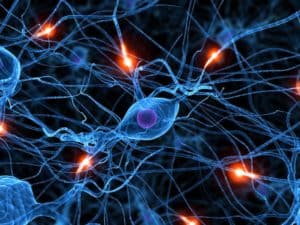
Neuroplasticity: Process where the brain adjusts to changes in your life
What Happens in Your Brain When You Sleep (Or Don’t)
Let me go on to explain this process known as Neuroplasticity. This process refers to the brain’s ability to adapt itself to new conditions by forming new neural connections. Neuroplasticity takes place when the brain recognizes a need to compensate and adjust brain activities in response to new situations or changes in your life. So, in the event of sleep deprivation for an extensive period of time, your brain may permanently change for the worse as a result.
The most obvious symptom of not sleeping well is lethargy the very next day. I am sure everyone felt that way before when they slept poorly. But there is more a deeper problem than lethargy. The consequences of not sleeping well are incremental and will get worse if you do not do something to intervene and remedy.
What Happens With the Occasional Sleeplessness
An occasional bad night might leave you:
- feeling listless and irascible
- with an inability to focus
- with a short temper
You may also feel amped up because your body produces extra adrenalin or you may feel slowed down because of fatigue. You will also experience a higher-than-usual ravenous appetite. There are two hormones in your body that regulate normal feelings of hunger and fullness. Ghrelin stimulates appetite, it lets your brain know when you are hungry. Leptin conversely sends signals to the brain when you are full. However, when you are sleep-deprived, your Ghrelin levels go up, stimulating your appetite so you want more food than normal. Your Leptin levels go down, meaning you don’t feel satisfied and want to keep eating. You end up in this viscous cycle of having signals sent to your brain to keep eating and no signals going to your brain to tell you that you are full. So, the more sleep you lose, the more food your body will crave.
What Happens in PROLONGED Sleep Deprivation
Several bad nights in a row can affect your cognitive function, as well as impair memory, concentration and mood. It is the accrual of sleep deprivation over weeks and months that can impair your immune system, disrupt your hormones and eventually lead to more serious health complications such as, obesity and diabetes, high blood pressure, heart diseases and even cancer.
A lot of hormones are secreted when you are asleep. Your body produces a protein hormone known as the Human Growth Hormone (HGH) when you are sleeping. HGH promotes the growth, maintenance and repair of muscles and bones by facilitating the use of amino acids (the essential building blocks of protein). Every tissue in the body is renewed faster during sleep than at any time when awake. Melatonin is another hormone produced to help us sleep. Secreted by the pineal gland deep in the brain, it helps control body rhythms and sleep-wake cycles. Levels of Melatonin rise as the body temperature falls, to encourage feelings of sleepiness. The opposite occurs to wake us up. Steroid hormone testosterone and the fertility hormones, follicle-stimulating hormone and Luteinizing hormone, are produced during your waking hours.

Stress is a common denominator for poor sleep
STRESS – Not to stress you out further, but…
When you fall asleep, your body switches from its active sympathetic nervous system (fight or flight) to the calmer parasympathetic nervous system (rest and digest). However, this gets interrupted with stress. When you’re stressed, the sympathetic nervous system doesn’t shut down, and your brain remains hyperactive. You may find this topic familiar in our previous blog posts about correct methods of breathing as well as rest and rest and recovery from the hormonal perspective. That is because, they are all linked – sleep, stress, breathing, hormones. That is the true remarkable nature of our human body, every part interacts and affects each other.
Chronic stress can lead to excessive level of stress hormones thus affecting sleep. This cycle will only continue to get worse! If you don’t sleep enough at night, your body boosts its levels of stress hormones. The brain chemicals connected with deep sleep are the same ones that tell the body to stop the production of stress hormones. As a result, when you don’t sleep well, your body keeps pumping out those hormones The next day, you feel more stressed, the following night you find it harder to fall asleep, and the vicious cycle perpetuates. Even worse, stress hormones peak in the early evening, just when you should be relaxing and preparing to hit the sack.

Caffeine can wreak havoc on your sleep
Stress Source #1: Caffeine
Everyone knows caffeine is a stimulant that keeps you awake. Most people won’t give it a second thought to pick up a cup of Joe to help them make it through the day. Caffeine can actually exacerbate stress levels and significantly affect the amount and quality of sleep you get.
Here’s the science behind the reason.
Caffeine blocks the action of adenosine and keeps a person awake. Adenosine is a chemical that builds up in the blood when a person is awake and causes drowsiness. The average half-life of caffeine is around five hours. When you drink coffee or take caffeine, your body gets rid of ½ the caffeine in five hours, ¾ in ten hours and 7/8 in fifteen hours. This means that caffeine will still remain in your blood when you're trying to sleep. It will be worse for some people that don’t tolerate and metabolize caffeine as well.
(Image Source: resttechnologies.com
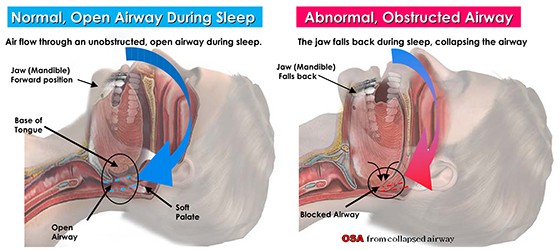
(Image Source: resttechnologies.com)
Stress Source #2: Your Posture
You may not know this, but your posture has a deep impact on your overall sleep quality. Here’s a quick recap of what we’ve discussed in the previous blog post on your jaw and your posture. An overbite is where the front teeth cover more than 1/3 of the lower teeth, which results in a forward head posture. With a forward head posture, your mandible or lower jaw is being pushed back and up into the temporomandibular joint. Your windpipe gets restricted, resulting in less oxygen to the brain. This lack of oxygen causes breathing to stop momentarily during sleep.
Your brain stimulates teeth grinding (bruxism) every time you stop breathing at night. The grinding motion pushes the jaw forward, reopening your airway, allowing you to breathe again. If this continues, constant teeth grinding will wear out your teeth, reducing the vertical dimension or space between your upper and lower jaw. Lack of vertical dimension will result in an even more forward head posture and poorer sleep! Our posture therapy system actually address this jaw related postural problem which indirectly aids sleep.
Go through this checklist to know if you have a sleep problem:
- You consistently don’t get 8 hours of sleep or have poor quality sleep
- You wake up feeling tired even though you slept more than 8 hours
- You keep snoozing and have trouble getting out of bed
- You struggle to stay awake while inactive (e.g. sitting, reading, watching TV)
- You need frequent naps
- You yawn or blink frequently
- You have darks circles under your eyes and are told by others that you look tired all the time
- You have difficulty paying attention or concentrating
- You often experience short term memory loss
- You have mood swings
- You have a slow reaction time
- You have performance problems at work
- You have disconnected thoughts or frequent daydreams
- You start dreaming right away when you fall asleep
How To Know if You Have Adequate Sleep
A good and clear indicator of your sleep quality will be your energy level in the morning.
- Do you get at least 7-8 hours of sleep?
- Can you wake up daily on time without an alarm?
- Do you have any problem falling asleep?
- Do you have any problem staying asleep?
- Do you feel well-rested and peppy when you wake up without any stimulants such as caffeine?
If you answered YES to all the above questions, chances are your sleep is fine. This is always one of the first few sets of sleep related questions we ask our clients in Genesis Gym as it gives us an overall picture of their current sleep status. The downside to these questions are that they can be quite subjective. More often than not, we have clients telling us that they feel their energy level is high when they wake up but after further probing, we discover it isn’t the case.

Bottom line is this: You should feel like you can literally jump right out of bed and raring to start the day! (Image Source: Youtube.com)
Another more objective method of monitoring sleep will be to either use a fitness tracker or a sleep app. There is no absolute benchmark or range which one should be in per se. The main idea is to trend and improve on the data rather than reporting.
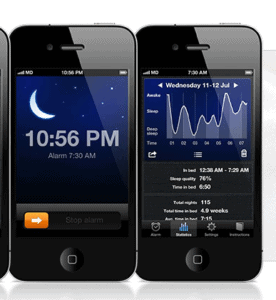
Apps like this one, Sleep Cycle (an iOS app), can help you note your sleeping trend and make slight improvements. (Image Source: lifehacker.com)
15 Good Habits to Improve Your Sleep Quality
You can establish habits to improve your sleep. These are simple to follow, which means, try them yourself immediately tonight.
#1: Be woken by light
This naturally raises your stress hormones which is a good thing in the morning as this slow rise helps you feel alert and relaxed.

Enjoy the sun!
#2: Get some exposure to sunlight
Light exposure sets your daily melatonin and circadian rhythm. This increases wakefulness during the day and helps your body wind down at bedtime. Aim for at least 30 to 60 minutes of sunlight exposure a day, preferable in the morning right after waking up.
#3: Get moving right away
Rather than lazing in bed or hitting the snooze button which increases sleep inertia, movement will speed the waking process.
#4: Avoid caffeine after 1pm.
If you are highly stress up and your lack of sleep is due to a racing mind, you might want to avoid caffeine altogether.
#5: Exercise regularly
Exercising regularly will help to normalize your body’s circadian rhythm, regulate your stress response and optimize your hormone levels. However, trend carefully with very intense exercises later in the evening as this may interfere and make it harder to fall asleep. You can contact us if you want our coaches to help you customise an exercise programme.

#6: Go to bed with an uncluttered mind
This can be achieved either from destressing activities like deep breathing, mediation and stretching or, penning down your thoughts so you don’t think about them when you sleep.
#7: Taper your water intake towards the end of the day.
You want to avoid frequent waking for bathroom breaks.
#8: Pick a regular bedtime and stick to it even on weekends.
This uses the power of habit and allows you to take advantage of your natural circadian rhythm to release calming hormones to help you fall asleep. Your body does not adjust quickly to different sleep schedules. Most people can reset their biological clock but only with appropriately time cues. Even then, by one or two hours per day at best.
Consequently, it can take more than a week to adjust after traveling across several time zones or switching to the night shift. Some people try to make up for lost sleep during the week by sleeping more on the weekend. It is fine if it is a one-off situation but it shouldn’t be a routine. Although this sleeping pattern will help relieve part of a sleep debt, it will not completely make up for the lack of sleep. Furthermore, sleeping later on the weekends can affect your sleep-wake cycle so that it is much harder to go to sleep at the right time on Sunday nights and get up early on Monday mornings.
#9: Strive for at least 7, ideally 8 hours of sleep.
Most people need 7-9 hours of sleep per night. If you are not getting anywhere close to 7 hours now, attempt to slowly increase your sleep. Even adding 15 minutes can make a huge difference.

Eat more protein during the day but more carbs at night
#10: Eat more protein during the day but more carbohydrates at night.
Protein is a mild stimulant for the brain because the amino acids block brain neurons that make us sleepy. This is good during the day as it increases mental acuity and keeps us sharp. Carbohydrates in contrast, activate the restful pathway, releasing brain chemicals such as Serotonin which is calming and makes you sleepy. Additionally, carbohydrates have the added benefit of being enjoyable, thus helping to reduce the stress hormones, cortisol, because they trigger a prolonged insulin release. Cortisol makes you feel more alert and is elevated in the morning to get you out of bed.

Artificial white blue light interferes with the production of melatonin (Image Source: sciencealert.com)
#11: Avoid using any electronics 30 minutes before bed.
Artificial white blue light are designed to look like the sun. It interferes with our production of melatonin, hence prohibiting us from falling into deep sleep. If you really need to, dim the lights, get amber bulbs or use an app like f.lux which changes the screen light to an orange hue which is easier on the eyes at night.
Electromagnetic fields from all electronics interfere with sleep. Even though it is near impossible to avoid any exposure to EMF during sleep since we live so close to our neighbours (unless they too switched off their electronics), we try to minimize EMF exposure as much as possible. Create a low electromagnetic field (EMF) bed room by switching off all electronics.
#12: Make your room as dark as possible like a bat cave
This is to maximise melatonin production. Blackout curtains, covering or unplug electronics that emit light, and wearing a sleeping eye mask help to create total darkness. Even when you are asleep, your brain can sense light exposure through your eyelids. Exposing yourself to light during sleep is bad when you want sleep.
#13: Your room should be cool and quiet
A bedroom that is too hot or too cold can interfere with quality sleep.
#14: Use supplements to improve sleep
Magnesium is not exactly a sleep supplement but it helps with sleep by decreasing the stress hormone that can keep you up at night. It also helps muscles relax, to give you that calm sleepy feeling and help you unwind after a long day. On top of helping you get a good night of sleep, it also shows potential as a therapy for depression and other mood disorders. If you tend to feel even more energize after taking magnesium, it is a sign that you are severely deficient in magnesium. The best forms of magnesium are the types with the suffix –ate (e.g. malate, citrate, aspartate). You want to avoid magnesium oxide as it is not well absorbed by the body.
Increasing Vitamin D3 levels can reduce insomnia and improve sleep because part of the brain that is responsible for sleep has a large concentration of Vitamin D3 receptors. Sleep is disrupted when Vitamin D3 is absent. Those with chronic pain have better sleep with Vitamin D3 as well.
Creatine can help mitigate the impaired cognitive and physical performance resulting from poor sleep. Energy phosphate is reduced with poor sleep resulting in reduced central nervous system activity. Creatine helps to replenish these brain phosphate stores, allowing for improved cognitive function.
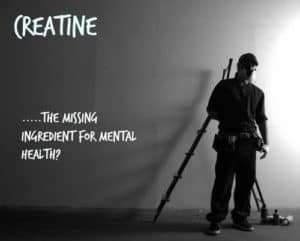
Creatine (Image Source: blog.healthkismet.com)
#15: Pick the best possible time to wake up
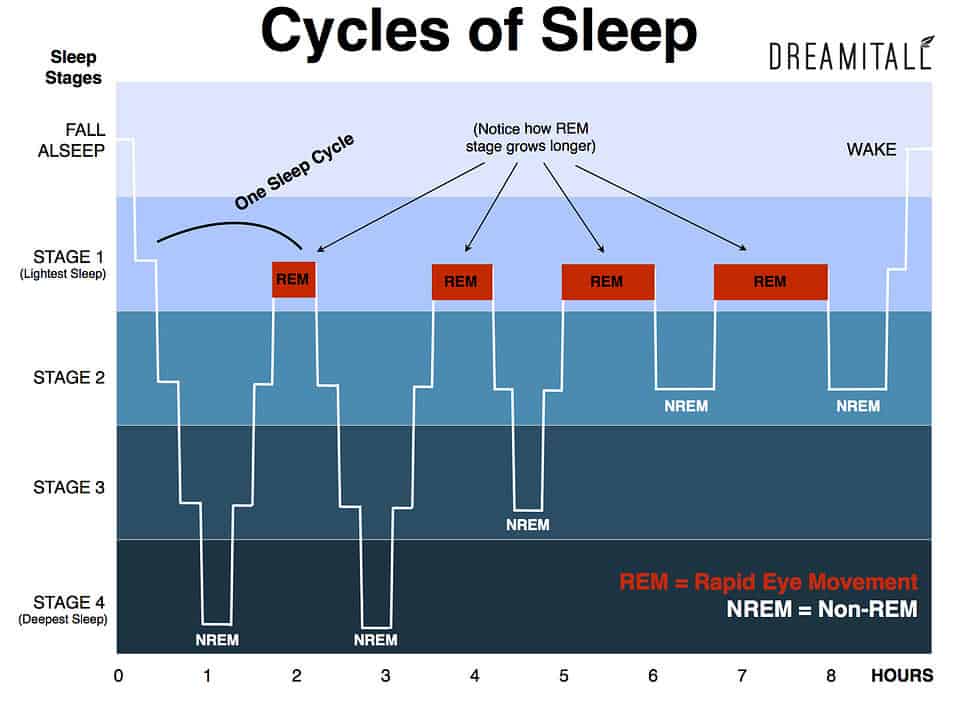
Cycles of Sleep (Image Source: dreamitall.net)
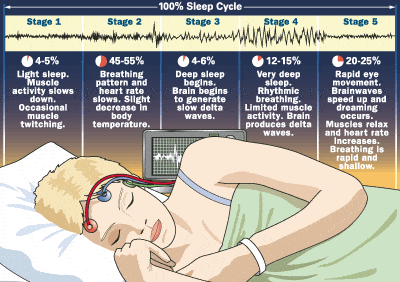
Sleep Stages (Image Source: psychologytoday.com)
You need to get 8 hours of sleep in order to complete the cycles of sleep. Otherwise, sleep quality and recovery will be compromised. It is impossible to overcome sleep deprivation through any other recovery method. If something helps, the results are merely temporary. Even if it is just an hour less, you may not be noticeably sleepy during the day but your cognitive and reaction time will be affected. It also compromises your cardiovascular health, energy balance, and ability to fight infections.
If you absolutely cannot get a full 8 hours of sleep each night, instead of setting the alarm to go off at the last possible moment, we can utilize the sleep cycle to see what would be the best possible time to wake up. It might make sense to sleep more to get better sleep but in reality, the quantity of sleep may not be optimal for your sleep cycle and productivity if you are getting less than the full 8 recommended hours.
The least optimal period to wake up is during stage 4, which is the deepest period of sleep. Waking up from stage 4 of the sleep cycle, usually leads to feelings of disorientation, grogginess, and possibly headaches. The pattern follows from least to most optimal to wake up is stage 4, 3, 2, 1, REM (stage 1 and REM being the most ideal stages during which to wake up).
When you consistently wake up from deep periods of sleep, this is subconsciously telling your body that you no longer need deep periods of sleep. As a result, sleep disorders are likely to occur. However, if you regularly wake up during the lighter periods of sleep, you will tend to feel well-rested and stay more alert throughout the day, with higher levels of productivity.
Take for instance, if you only had 5 hours of sleep, it would be more ideal to wake up at the end of the REM cycle which should occur at only 4 hours 15 minutes than to wake up at any point between 4 hours 15 minutes and 5 hours since your body will be in a deeper stage of sleep in that final 45 minutes. Another thing to understand is that the first 4 hours of sleep is where most of the deep sleep occurs. As the sleep cycle continues, you will spend less time in deeper periods of sleep and more time in REM sleep.
There are apps which you can download that utilizes the sleep stage chart. If you know you will not be getting a full 8 hours of sleep, try to wake up in a lighter period of sleep even if that means you will get less total sleep. You will find that you will feel more refreshed and be more productive.
Conclusion
A good night’s sleep isn’t a luxury; it’s a necessity! If you have problems sleeping, do give the above sleep hacks a shot. If nothing else work, you may want to consult a doctor or a sleep specialist.
The Genesis Gym customised personal training programmes are not just tailor-made fitness training, our coaches also help you in 3 major aspects to achieve good health holistically:
#1: Manage your stress levels
#2: Customise your nutrition plan
#3: Help you alleviate chronic aches and pains
To find out how Genesis Gym can start you on your #transformationjourney, call us now at 93374188 or email [email protected].
